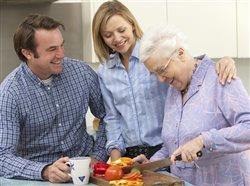
Real reasons why grandma won’t eat – and how you can help improve her nutrition
(BPT) – Every parent knows good nutrition is critical for your kids, and getting them to eat well can be an on-going struggle. But what if you’re also helping care for an aging parent? Ensuring older adults eat well can be even more frustrating than getting children to eat right, but it’s every bit as important.
‘It’s not uncommon for sandwich generation caregivers to say it’s more difficult to get their senior parents to eat well than it is their kids,’ says Dr. Kevin O’Neil, chief medical officer of Brookdale Senior Living, and a clinical professor of aging studies at the University of South Florida. ‘There’s a level of parental authority when managing children’s diets that’s not there when dealing with seniors who – for whatever reason – are resistant to improving their diets. Yet good nutrition is essential for a senior’s overall good health.’
Malnutrition in seniors can lead to a host of health problems, including a higher risk of infection, weakened ability to heal, breathing problems, muscle weakness and depression, according to the Caregiver Partnership. Yet it’s a prevalent problem in the U.S.
One 2014 study published in the Annals of Emergency Medicine found more than half of the seniors studied were malnourished and more were at risk of becoming malnourished. While many studies have confirmed a link between poverty and malnutrition in many age-groups, lack of access to nourishing food isn’t always the cause of senior malnutrition.
‘Seniors who struggle to eat well or who seem disinterested in a good diet aren’t just being stubborn,’ O’Neil says. ‘A number of physiological changes can affect appetite for older adults.’
Factors that influence appetite in seniors can include:
* Decreased caloric needs – A moderately active woman older than 50 needs about 1,600 calories a day, and a 50-plus man who is moderately active needs about 2,200-2,400, according to the Institute of Medicine. Sedentary seniors will likely require fewer calories, and those who are very active may require more.
* Gastrointestinal changes – Age-related changes in the stomach and intestines can make seniors feel full sooner and remain feeling full for longer.
* Loss of taste and smell – As people age, their ability to smell and taste can diminish. Medications may also affect how things taste and smell to seniors. Both senses are tied to appetite; seniors may say they don’t want to eat because nothing tastes good to them.
* Dental or oral health – Seniors who experience oral issues, such as mouth ulcers or ill-fitting dentures, may find eating to be uncomfortable or even painful. Dry mouth is very common and may be related to medications or an underlying medical problem.
* Illness – Some diseases can cause a decrease in appetite, or medications to treat illness or chronic health issues may also affect the desire to eat.
* Depression – Seniors who feel lonely or depressed may be less inclined to eat.
* Dementia – If they’re experiencing dementia or Alzheimer’s, seniors may simply forget to eat meals.
‘With patience and persistence, and empowered by knowledge, caregivers can help their elder loved ones improve their diets,’ O’Neil says.
First, he advises, talk to your loved one and his or her doctor about the possible source of appetite loss; it’s important to rule out any serious underlying medical issues. If your loved one’s poor nutrition is linked to one or more common age-related factors, consider these steps:
* Encourage more flavorful but healthful food choices to combat a diminished ability to taste and smell. Adding herbs and spices to meals can help an elder more enjoy the taste of food. However, avoid increasing salt intake, as higher sodium levels can be associated with increased blood pressure.
* Drink plenty of water and fluids. Only take vitamins and supplements if you have a demonstrated deficiency and then with the guidance of a physician, nutritionist or dietician. Excesses of vitamins and supplements may be harmful.
* Be guided by the USDA’s Food Pyramid when choosing healthy foods. Since seniors need fewer calories, the quality of calories they consumer is critical.
* Seniors who eat less due to depression or loneliness may benefit from a senior living situation where they never have to eat alone, and professionals are on hand to offer guidance and nutritious meals.
* Share meals with your loved one. No one likes to eat alone, and sitting down together for a meal – even if you only have a cup of coffee while they eat – can help seniors enjoy their food more.
‘Good nutrition is a critical component of overall health for everyone, and it’s especially important for seniors whose energy reserves may be lower and who may be less able to recover from health issues when they’re malnourished,’ O’Neil says. To learn more about senior living communities and nutrition for older adults, visit www.brookdale.com.


